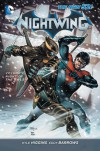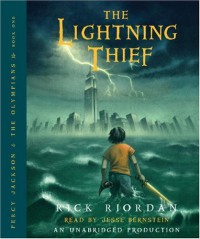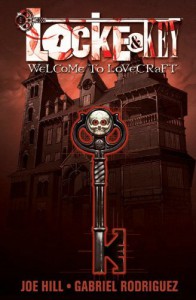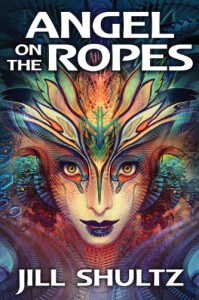Currently reading
The Sea of Monsters
Paladin of Souls
Batman: The Night of the Owls
Nightwing, Vol. 2: Night of the Owls
 I just really have a lot of feelings about everything and I think my final review of this series will be long and full of feelings. LOL.
I just really have a lot of feelings about everything and I think my final review of this series will be long and full of feelings. LOL.
 This really was not the book for me even Neil Gaiman couldn't change that. It's not terribly written for the most part, but there just wasn't anything magical about it for me.
This really was not the book for me even Neil Gaiman couldn't change that. It's not terribly written for the most part, but there just wasn't anything magical about it for me.
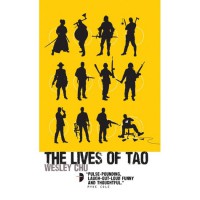 Crossposted to The BiblioSanctum
Crossposted to The BiblioSanctumFirst, I would like to thank Netgalley and the publisher for allowing me to read this book in exchange for an honest review.
Roen Tan is an out-of-shape IT tech just trying to make it through the daily grind when he becomes the host of an advanced alien named Tao. When he finally becomes aware of Tao, Roen thinks he’s about to live the glamorous life of a super spy as Tao gives him knowledge beyond his measure and starts whipping him into shape with diet and exercise. Roen quickly learns that James Bond’s glamorous life is a complete fraud and that spy work is tedious, time-consuming, and nothing like a superhero movie. However, Roen does find himself with Tao’s help and begins to push past his safe boundaries.
The first thing you should know about me is I always root for the underdogs. I am a huge fan of unconventional heroes doing unconventional things, especially unconventional things they seem ill suited for. Roen fits all of those qualifications. Reading this story was like watching an awkward friend grow into a graceful swan. It was funny, endearing, and just a tad bit cute—all things considered. At the beginning of this story, Roen isn’t living more than he’s just existing. He wants a better life, but he’s not motivated to take the steps needed to achieve that until he becomes Tao’s new host.
Tao’s people have lived on earth long before humans were even conceived, and they’ve been working just as long to find a way off this rock. This has been a very slow process for them since their survival on Earth means they have to rely on host bodies to protect them and carry out the tasks necessary to their goals. As with any group trying to achieve a common goal, though, there’s dissension about how that goal should be achieved. For this reason, after many years of working together, Tao’s people split into two factions—the peaceful Prophus and the warlike Genjix.
Second thing you should know about it is that I love history, so I appreciated how Chu incorporated that into his story by having the Prophus and Genjix part of every pivotal moment of history and explaining a little bit about how their involvement shaped those moments. Tao, who is part of Prophus, admits that both sides have done some terrible things throughout history, but sometimes, you have to choose the lesser of two evils for the greater good. This is one of the things that Roen begins to struggle with as he becomes a better Prophus agent.
Roen made me laugh out loud and roll my eyes often at the same time. The character felt like the type of friend I’d call up and say, "Calm down, man. Breathe. Now, you go and be awesome, Roen." He reminded me so much of someone I know who I could picture in Roen’s place doing the exact same things. Over the course of the story, he didn’t become some supreme super spy, but he grew as a person and as an agent. He came to terms with his new mission in life. Yeah, he did some amazing things during this, but through it all, Roen managed to continue to feel like an everyday person.
I loved Tao’s seriousness tinged with just a hint of humor, and I thought the story of his race and their struggle was interesting. Their role in history and the vast knowledge they possessed was a nice touch. Even though they seem to have all the elements there to be a super race, they’re still hindered by their divisiveness, vulnerability and lack of resources on a planet that they’re basically manipulating down this technological evolutionary path to aid their agenda. I wish I could’ve learned a little more about Tao’s people, but that’s such a small complaint for an otherwise fun book.
This was a wonderfully engaging story. The tone used felt very familiar, giving the story a very easygoing feel that kept me reading. It doesn’t seem to take itself too seriously, which was a welcomed break from all the grimdark I’d been reading lately.
 It's certainly knows how to get a reaction out of me, but I'm not sure how I feel about it yet. It depends on how much of this LOST in high school madness I have to go through that will ultimately decide.
It's certainly knows how to get a reaction out of me, but I'm not sure how I feel about it yet. It depends on how much of this LOST in high school madness I have to go through that will ultimately decide.
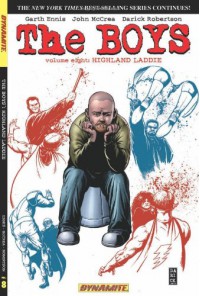 3.5 stars. Have some mixed feelings about this one, but I think over all I like it. Now, I've told myself I can't read volumes 9-12 until I catch up on my other books.
3.5 stars. Have some mixed feelings about this one, but I think over all I like it. Now, I've told myself I can't read volumes 9-12 until I catch up on my other books.
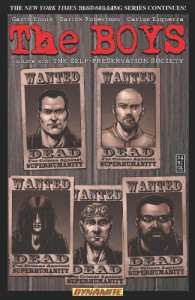 Frenchie in is a lunatic. I love him, though. I think his origin story is like Joker's telling of his story. In all that craziness, there must be a grain of truth, and maybe that's why Ennis told his story like that.
Frenchie in is a lunatic. I love him, though. I think his origin story is like Joker's telling of his story. In all that craziness, there must be a grain of truth, and maybe that's why Ennis told his story like that.
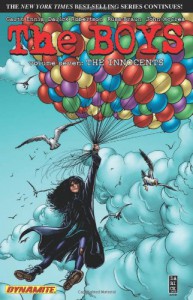 Hughie, Hughie... you simp, what are you doing? You are obviously being played.
Hughie, Hughie... you simp, what are you doing? You are obviously being played.Ugh, Butcher is starting to make me so mad.
Overkill
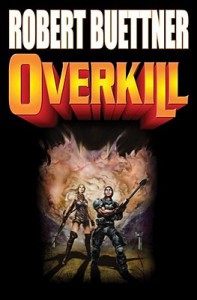 I originally bought the book as an impulse buy from Audible because they kept taunting me with a deal on certain books. This was one of those books whose description was written in a way to capture the reader's attention while still managing to be vaguely suspicious. I wasn't sure if I liked the cover (recovering cover snob that I am), but I decided to give this a try, even if my brain did try to tell me that this was probably going to be Space Rambo. However, since this was my science fiction month and I wanted to round out my selection and adding to the fact that the reviews were mostly favorable, I decided to give it a chance. Surprisingly, it was an interesting listen.
I originally bought the book as an impulse buy from Audible because they kept taunting me with a deal on certain books. This was one of those books whose description was written in a way to capture the reader's attention while still managing to be vaguely suspicious. I wasn't sure if I liked the cover (recovering cover snob that I am), but I decided to give this a try, even if my brain did try to tell me that this was probably going to be Space Rambo. However, since this was my science fiction month and I wanted to round out my selection and adding to the fact that the reviews were mostly favorable, I decided to give it a chance. Surprisingly, it was an interesting listen. Twenty three year old Jazen Parker agrees to go to a planet known colloquially as "Dead End" with a rich tycoon to hunt one of the deadliest animals in the universe. The payout from this job will help Parker to get a new identity and start his life anew without the threat of the former mercenary group he worked for since he was a teen or the bounty hunters who want to take him back to his home planet to answer for his "crime." He was born illegally on his home planet, and even though that wasn't his fault, he can still be punished for his parents' crime.
It's really hard to talk about this book without spoiling most of it. You think you're going into the book just getting a straightforward sci-fi military story with lots of action, and you do get that. However, you also get a well crafted sci-fi story that won't allow itself to be shoehorned into just another shoot-em-up story. This story explores human nature and the similarities and differences that could exist between two intelligent races by giving us chapters from the alien's point of view. He finds much of human behavior complex and needless. His own race is at an apex where they are absolutely on top of the food chain on their home planet and don't need many of the behaviors that humans possess. The longer he travels with his human companions the more he learns about things such as empathy and sacrifice, notions he doesn't have in his own culture because individuals in his race live solitary lives. They're firm believers in allowing an individual to meet his destiny alone.
We also learn more about this other race in the process. We learn about their loose society structure and how they've managed to thwart genocide by humans by pretending to be dumb creatures. As stated in the book: "Overall the human species tolerated dangers in nature. What they did not tolerate were rivals." Even though they know they are more intelligent and capable than humans. Humans possess knowledge and skills that make them very dangerous, especially to a territorial, solitary species like his where teamwork is downright disrespectful because it means encroaching on each other’s boundaries. However solitary they are, there is a thread of unity between them, a way they exchange knowledge, history, and ideas among themselves. They're stubborn about their worldview being the only view and humans are obviously delusional in their opinion until circumstances causes one of them to embark on a pivotal journey.
Humans in this book have conquered most of the known galaxy, becoming so numerous on some planets that it's a crime to reproduce without consent. (And I don't really understand why Parkers parent traveled to a planet where it's a criminal offense to have Parker, but maybe they had no other choice.) It's even mentioned that they have destroyed other intelligent species after being given resources they needed and have turned back to warring against each other, but with more dire consequences (such as slavery, even though it's supposedly humane, is a fate for the conquered). Humans are detached from earth, most having never seen earth and know little of its history.
Humans not knowing about their history, even if they've never laid eyes on earth, pains me. Parker will sometimes gripe about how trueborns think earth is the cultural apex of the universe and how names like George Washington mean nothing to him. While I can understand the sentiment, there are no other cultures present since it seems that humans have wiped out any other intelligent species, and the culture Parker complains about is the same culture who opened up the universe to humans. Just as Parker’s home world should be just as important to trueborns because it the collective history of humanity. Why wouldn't the history of earth and humans be some kind of required reading? I'm over thinking this thing.
I didn't know if I was going to enjoy the narrator at first, but he did very well and I think his characterization of Parker is what really stood out to me. He really made him feel distinct and alive for me. He managed to capture the youth and battle weary aspects of Parker's personality. Parker is young and naive about many things outside of battle like women, but he's seen so much war and death as a legionnaire. And MacCleod Andrews did a great job of capturing that.
This was an excellent story. There were a few parts that seemed kind of mystifying (Parker's parents' decision on where to have him) and parts that seemed to be quickly cobbled to the story as it neared its end. However, Buettner is knowledgeable about military and made it work in a way that isn't overwhelming for readers. He also knows how to make characters engaging, and I thought more than once he'd probably be a great writer for the Mass Effect series. I'll be moving on to book two in this series soon, hopeful that some mysteries remaining are solved.
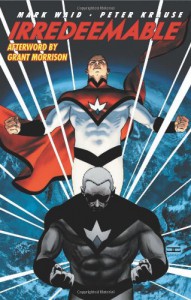 You tell a man he's a god enough times, and he'll start to be believe it. You strip away his humanity by worshipping him, and eventually he'll think it's his right to lord over you. Continuously mention that his powers are the only reason the planet still turns, and one day that virtue that compels him to save you will turn into the vice that causes him to decimate whole cities without remorse.
You tell a man he's a god enough times, and he'll start to be believe it. You strip away his humanity by worshipping him, and eventually he'll think it's his right to lord over you. Continuously mention that his powers are the only reason the planet still turns, and one day that virtue that compels him to save you will turn into the vice that causes him to decimate whole cities without remorse.However, despite that recipe for disaster, there's still one more key ingredient. The inner struggle that a person like this would face. Someone who struggles with difficult decisions everyday in regard to the safety of others. Out of millions of people, who do you save and who do you let die? How do you deal with humanity's capacity for ingratitude when you don't save them in the manner they wish to be saved? How do you deal with people who try to marginalize your feats by calling you a "pervert in underwear?"
The answer is simple in the case of Plutonian. You've ignored that he is human (or humanoid) and has human weaknesses and emotions. You've rejected his attempts to be normal, to give him something that anchors him to his human side. There's no longer any need for him to act like a mere human. You've made him a god, and now, he becomes a god. He has every right to judge anyone--hero, villain, and civilian--because he's your god, a monster of human creation.
I know I'm still in the early stages of this series, but the above is what I gathered from the first volume. These opinions may change as I continue to read this series, and I'll acknowledge that when the time comes. Once Plutonian turns, he doesn't discern between friend and foe--taking some lives, leaving others alive to suffer his carnage. Making a hero, a hero who questioned Plutonian before his heel turn about how it felt to be responsible for so many lives, choose ten people out of millions to save and then killing the rest before that same hero's eyes while telling him: "This is what it felt like."
While Plutonian is inarguably the greatest super-powered being on earth (I know Max Damage from Incorruptible is pretty strong himself and can, at the very least, withstand Plutonian's abuse, but I'm not sure yet if he could actually beat Plutonian at this point), this story for me isn't just about the greatest superhero on earth becoming the greatest supervillain. It's a story about a man who wasn't allowed to be human, so he became a god instead.
Waid has also taken some traditional superhero tropes and turned them on their ear such as what if a hero did confess his identity to someone one close to him, expecting their inexplicable acceptance of who he is and forgiveness for hiding his identity all this time to protect them. Yeah, this ain't Superman, honey. What if a hero didn't get all the acceptance and support he needed from the people around him? What does he do then? Waid is addressing things that I've questioned in comic stories.
And I really love this about the story.
However (you knew a HOWEVER was coming), I'm not as drawn into the story as I'd like to be even though I do like the foundation of it. And maybe this partly by my own design because instead of focusing on this series first I read the first volume of The Boys which I really, really enjoyed. When I love something and I start moving on to other similar media/genres, I expect them to keep my enjoyment buzz going. That isn't this comics fault, and as I said, it's not a bad comic. I probably should've waited a few more days when I wasn't thinking about The Boys anymore. I have a tendency to ponder things long after I've read them.
Another problem I'm having is with Volt who is an African-American superhero with electricity powers. Most of his panels include switching into AAVE (African-American Vernacular English) to prove how racist the white people are and how little they expect of him, which was true in a couple of panels. Other times, it just seems kind of random and unnecessary. He also enjoyed pointing out a black superhero with electricity powers is a cliche when nobody said anything about it, but what can he do about it? The only thing he really said that spoke to me, something that I’ve spoken about with other comic book fans of color, is the need to add BLACK to the beginning of some black or ambiguously brown heroes’ names. He’s Volt, guys. Just Volt. PREACH, Volt!
I’m hoping Waid does better than this with Volt because as it stands he feels silly, forced, and unnatural at times as if Volt is incapable of being a normal person while facing issues that concern his race. It seems he can only be one or the other, but not both at the same time. So far, instead of pointing out why such behavior is problematic, Volt would rather sarcastically respond to their micro-aggression by slipping into jive talk and leave them to their “accidental” racist tendencies. And while I think Waid is an exceptional writer when it comes to showing the moral standings of heroes, I’m not sure if I think he is capable of providing an adequate portrayal of how an African-American superhero deals with racism as a person and as a hero because this can be a tough issue for anyone to grasp.
This was an interesting beginning, though, and I'll move on to the next volume, but only time will tell whether Waid handles the complex issues he's setting up expertly or not.
 4.5 stars. No, this is not okay. It's not okay for Ennis to make me have these feelings. It's just not. I get overly emotional about fictional people. Full review later.
4.5 stars. No, this is not okay. It's not okay for Ennis to make me have these feelings. It's just not. I get overly emotional about fictional people. Full review later.
 2.5 at best. The thing with Crow comics is that I typically enjoy the novelizations better than the comics.
2.5 at best. The thing with Crow comics is that I typically enjoy the novelizations better than the comics.
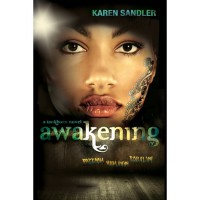 First, I wanted to thank Netgalley and the publisher for allowing me to read an advance reader copy of this book in exchange for an honest review.
First, I wanted to thank Netgalley and the publisher for allowing me to read an advance reader copy of this book in exchange for an honest review. This book picks up some months after the events in Tankborn. Kayla is part of an underground movement working toward freeing GENs from the life of oppression. Kayla, along with her lowborn companion, travel from sector to sector retrieving and delivering information for the kinship (a network of trueborn, lowborn, and GENs working together). While Kayla believes her overall work is good, she wonders if the kinship is truly as dedicated to this cause as they say. Are they truly willing to risk so much for GENs? She knows that most members of the kinship, no matter their social rank, hold her in high regards, but she wonders if this because she's proven herself. When they look at her, they see an individual. She's not some insignificant GEN girl. Kayla also continues to struggle with her feelings for Devak, the trueborn boy whose grandfather (and prominent member of the kinship) she cared for in Tankborn.
There many things going on in this book. I mean, the last book had a couple of different issues going on, but they seemed to connect together from the very beginning of the story. Some of the things introduced into this story didn't feel like they fit anywhere at first and didn't really pull together until toward the end of the story where things seemed to progress at a rapid pace as the author tried to wrap the loose ends. There's nothing wrong with everything not coming together until later, but it made some things feel so rushed even though their impact on the story and what they mean for the people involved is important. I didn't feel like this was as intense as the last story was, but overall, I felt this was still a solid story about the struggles surrounding the GENs,
I know this a young adult book and you have to have romance, but I got a little tired of Kayla and Devak's song and dance. I realize their relationship is extraordinary and nigh impossible. The societal pressures and laws that threaten to keep them apart weighs heavy on their hearts. This causes them to make decisions and mistakes that draw them further apart, though I did like Kayla's speech that Devak couldn't decide what was best for both of them without her input. So much of her life has been spent with her choices being stripped from her by people that "know" what's good for her. She wasn't willing to accept that in a relationship with someone who supposedly cared about her.
However, it didn't feel like Devak really understood what Kayla was telling him instead he begins to nitpick and take what she said out of context. I guess I can understand since he's used to being listened to and doted on. It's hard to see where privileged behavior comes in at times when you're used to things going your way. However, it just felt a little disappointing and typical of someone with status. In any event, I felt like their drama just really took away from the story at times. I think it could've been streamlined into the story more.
I wish Sandler spent a little more time world building. It seems like she's created this wonderful place, but we only get to hear about some of its nuances from time to time. From the first book, I knew they had two named suns, but it wasn't until this book that we learned they also have two moons. Also, the religious beliefs of the various social classes should be explored more since the trueborn don't believe as the GEN do, and the lowborn have their own take on what the GEN believe. And religion plays an important part of the story in these books, especially what the GEN believe.
After the ending of this book, there's no doubt there will be another. It ended on a very tense cliffhanger, and I'll definitely be awaiting the next book.
 Leo Graf a talented engineer who finds himself pulled from his current station to a habitat operating in a system on the fringes of intergalactic law. Leo is chosen to teach welding to a group of special cases. He doesn't learn how special until he reaches the habitat and witnesses just how loose and fast his employers have played with genetics. Soon, Leo finds himself placed in the center of a revolution, forcing him to confront the ambiguous morality that plagues the Cay habitat, forcing him to take a stand where he'd once only wanted to do his job and stay under the radar.
Leo Graf a talented engineer who finds himself pulled from his current station to a habitat operating in a system on the fringes of intergalactic law. Leo is chosen to teach welding to a group of special cases. He doesn't learn how special until he reaches the habitat and witnesses just how loose and fast his employers have played with genetics. Soon, Leo finds himself placed in the center of a revolution, forcing him to confront the ambiguous morality that plagues the Cay habitat, forcing him to take a stand where he'd once only wanted to do his job and stay under the radar.The quaddies (the experimental humanoids who are classified as "post fetal experimental tissue cultures) are considered little more than inventory, and the company who funded the project to create them are equally as anxious to find a way to get rid of them once they're proven to be obsolete. They don't have standings as human beings. They shouldn't exist and aren't protected under intergalactic law. Leo, who has only worked with the quaddies for a few months, seems to be the only person who acknowledges that they are people despite their appearance. He hatches a plan to save them and allow them to live life on their terms. Leo's plan to help the quaddies gain freedom is enormous in scope and seems a bit too ambitious, but the alternative is far worse.
This is actually the fourth book in the series, but I'm reading the series in chronological order as suggested by the author herself. My first jaunt with Bujold was with her book The Curse of Chalion, which I loved because it played with many interesting ideas about things like godship and wit being a far more capable weapon than swords. I wasn't quite as taken with this story or its characters. While I undeniably did care about Leo and the quaddies. I never connected to them in the same way as I did with Cazaril and company in The Curse of Chalion.
However, that doesn't mean the characters are shallow by any stretch. I just felt like I didn't get enough time with them. Bujold has a wonderful hold on characters regardless. Even when I may think the story is dragging a bit, the characters make up for the lull. Leo is a good man. He's a hardworking engineer who says what he means without tiptoeing around the truth. He has a sense of honor that won't allow him to remain passive in the face of the injustice he's witnessing on Cay.
One thing that threw me off was how we don't really see the pivotal point Leo made his decision to help instead of standing by idly. One page, he's saying that he's not going to risk his retirement, and literally, the next page Leo has decided to be involved. True, readers already know that Leo doesn't appreciate the politics and word mincing involved with the assignment, but he'd resolved to be a bystander and leave well enough alone. We don't get to witness that moment when he decides that he will not be an observer. It's not even touched on briefly in the prose.
Even though this is only the second book I've read by Bujold, I've noticed that May-December romances seem to be a thing with her writing with the man lamenting how old he is in comparison to the woman he desires. With Leo and Silver, there were echoes of Cazaril and Beatriz. There is certainly nothing wrong with that, especially since the romance is nicely understated, but it was just something I noticed. I guess all writers have their formula they have to sneak into their stories.
This was a very interesting premise. I enjoyed the story for what it's worth and found the plight of the quaddies and Leo's dilemma of helping them compelling and fast paced. I will say that this story felt as if it went much quicker than The Curse of Chalion, which had bits that felt like filler. Also, Bujold doesn't bog readers down with too much "science." I don't mind it, but some people find it a bit daunting and confusing. Bujold explains the scientific elements involved very well and in a manner that's understood even by those who may not be big on sci-fi.
I'm very interested in seeing how this fits in the grand balance of the Vorkosigan universe based on what little I already know of the series.



